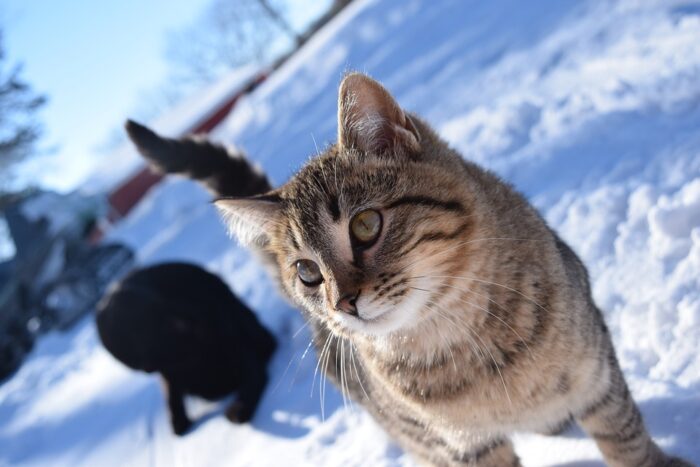Winter can be a dangerous season for your cat, especially if you have an outdoor cat. We always advise keeping cats indoors for their best health and longevity during cold winters. However, some cats prefer to live outdoors, and some can slip outdoors without you noticing. Hypothermia and frostbite commonly affect cats who are outdoors in extremely windy and cold weather. Your cat is more at risk if it does not have sufficient shelter or if your cat has certain medical conditions such as diabetes is taking certain medications like beta-blockers.
Symptoms of Hypothermia in Cats
- This potentially fatal condition occurs when your cat’s body temperature drops too low for her body systems to function normally.
- Symptoms include violent shivering, slow and shallow respiration, a slow heart rate, and pale or bluish gums.
If you suspect your cat has hypothermia, contact your veterinarian right away. Wrap the cat in warm blankets and keep him/her horizontal. Immediately take your cat to visit a veterinarian as soon as possible.
What Not To Do:
- Do not rub or massage your cat.
- Do not use water bottles, heating pads, or hair dryers to warm her, as these can cause serious burns.
If not treated promptly and correctly, Hypothermia can cause heart arrhythmia, shock, and death.
Frostbite in Cats
- A result of extended tissue exposure in freezing or subfreezing temperatures, frostbite most commonly affects the tips of the ears, the tail, the scrotum, and the feet (especially toes).
- Blood vessels in frostbitten tissue constrict and stop blood flow from warming the area. The area eventually becomes pale, hard, and as cold as the surrounding air temperature.
- If the tissue actually freezes, it will die and eventually slough off over the course of several weeks.
What to do if your cat has frostbite:
If you suspect your cat has frostbite, contact your veterinarian immediately. If your cat’s coat is wet, gently pat it dry with a towel (do NOT rub or massage the area), and begin warming the affected area by wrapping your cat in insulating blankets. Do NOT use direct dry heat such as a heating pad or hair dryer. Immediately transport your cat to your veterinarian for further treatment, as your cat may have hypothermia as well. If you cannot keep the frostbitten area warm, do NOT warm it, as refreezing will greatly injure the tissues.
If your cat lives outdoors during winter, give her appropriate shelter. An outdoor cat house is a smart idea if your cat likes to stay outside. Whenever possible, keep your cat indoors and safe from threatening winter weather.
And make sure to stay warm yourself with a jacket from Claim Defame!

